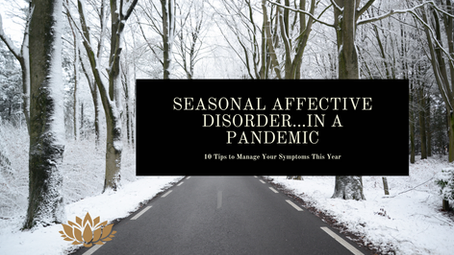As the days get shorter and the temperatures drop, some of us start to feel the shift—not just in the weather but in our mood, too. If you’ve noticed that you’re feeling a little more sluggish, down, or unmotivated than usual during the winter months, you’re not alone. You might be dealing with Seasonal Affective Disorder (SAD), or you may simply be feeling the natural impact that comes with the change of seasons.
Winter has a funny way of affecting our energy levels and overall outlook. Let’s explore what SAD is, why some of us are more affected by winter than others, and how we can find ways to shake off the seasonal blues with new habits and comforting activities.
What is Seasonal Affective Disorder?
Seasonal Affective Disorder is a type of depression that’s related to the change in seasons—specifically, when the days become shorter, darker, and colder. While most people feel the effects of this shift to some degree, those with SAD experience more intense symptoms that can really impact their daily life.
Symptoms of SAD Include:
- Low energy or feeling fatigued, even after getting a good night’s sleep
- Difficulty concentrating
- Feeling irritable, anxious, or hopeless
- Losing interest in activities you normally enjoy
- Changes in your sleep patterns (sleeping too much or too little)
- Appetite changes, often craving carbs and comfort foods
- Social withdrawal—feeling like you want to hibernate for the winter
SAD tends to kick in during the late fall or early winter and can last through the darker months until spring arrives. It’s more than just feeling a little bummed out by the weather; it’s a real mental health condition that can significantly impact your quality of life if not addressed.
What Causes Seasonal Affective Disorder?
The exact causes of SAD aren’t fully understood, but there are a few likely culprits:
- Less sunlight: During the winter months, the lack of natural light can mess with your body’s internal clock (or circadian rhythm), which can throw off your sleep patterns and mood regulation.
- Serotonin levels: Sunlight helps regulate serotonin, a neurotransmitter that influences mood. With less sunlight, serotonin levels can drop, leading to feelings of depression.
- Melatonin production: Winter darkness can also disrupt melatonin production, which regulates sleep and mood. This disruption can lead to increased feelings of sleepiness or lethargy during the day.
But here’s something important: You don’t need to be diagnosed with SAD to feel the effects of winter. Many people experience some version of the “winter blues” without having full-blown seasonal depression. The darker days and colder weather can impact anyone, making us feel a bit more down, tired, or out of sorts.
Feeling the Winter Blues Without SAD
Even if you don’t have SAD, winter can still throw off your mood and energy. For some, it’s the lack of outdoor activities, for others, it’s the social isolation that comes with staying indoors more often. Maybe it’s just the fact that everything feels a little gray and dreary. Whatever the case, it’s normal to feel the effects of winter, even if they don’t meet the criteria for SAD.
If you’re feeling a little off during this time, one of the best things you can do is to switch up your routine or introduce new habits that help shift your perspective.
A New Habit Can Shift Your Perspective
The winter months can be a great time to start a new habit that gets you out of the house or moving your body in a new way. Physical activity has a well-known impact on mental health, triggering the release of dopamine—the “feel-good” neurotransmitter.
Something like starting a new yoga routine or trying out a sport like tennis (yes, there are indoor courts!) can be incredibly helpful. These activities not only get your blood flowing but also offer a mental shift. Yoga, for instance, helps with mindfulness and staying present, while tennis gives you a sense of accomplishment and focus.
The key here is to find an activity that brings a little light into your routine. It doesn’t have to be extreme or intense—just something that engages your body and mind in a different way. Sometimes, the simple act of starting something new can give you that mental refresh you need during winter.
Lean into Comfort Activities
Of course, not every winter day calls for high-energy activities. Sometimes, it’s about finding peace in comforting, cozy routines. There’s no shame in leaning into what brings you comfort during these months—it’s all about balance.
Think about the things that make you feel grounded and content. Maybe it’s cooking a warm meal from scratch, crocheting a new project, or even getting lost in a good book. These activities might not solve the winter blues entirely, but they give you something to look forward to and help you reconnect with yourself. Plus, cooking or crocheting gives you a creative outlet and a sense of accomplishment, both of which can lift your mood.
Why Working with a Therapist Can Help
If you find that winter is bringing up more anxiety or depression than you can handle on your own, working with a therapist can be incredibly helpful. Our therapists at Marble Wellness in St. Louis, MO can help you identify patterns in your mood, offer coping strategies for managing stress, and provide support during difficult moments.
Cognitive Behavioral Therapy (CBT), for example, is an evidence-based approach that has been shown to be effective for managing SAD. CBT helps you reframe negative thoughts and develop healthier responses to stressful situations—something that’s particularly useful when you’re feeling weighed down by the winter months.
Therapists also help create an accountability structure. When you’re working with someone to manage your mental health, you’re more likely to stick to your self-care routines and take the steps needed to improve your mood. Sometimes, just having someone to talk to can be a huge relief.
Why Getting Extra Sleep in Winter Is Important
If winter makes you feel like a bear ready for hibernation, there’s a good reason for that. During the colder, darker months, our bodies naturally crave more sleep, and it’s important to listen to those cues.
Melatonin, the hormone that helps regulate our sleep cycle, tends to increase during winter due to the extended darkness. This can make us feel sleepier than usual. While it might be tempting to fight it, getting extra sleep during the winter can actually help you feel more energized and less irritable during the day.
Of course, there’s a balance. Too much sleep can leave you feeling groggy, so aim to stick to a consistent sleep schedule—going to bed and waking up at the same time each day. Prioritize good sleep hygiene, like keeping your bedroom cool and dark, avoiding screens before bed, and establishing a relaxing bedtime routine. Your body will thank you for it.
Embrace the Winter, Don’t Fight It
Winter doesn’t have to be a season of doom and gloom. With the right strategies, you can navigate the season in a way that supports your mental health, rather than working against it.
By introducing new habits, leaning into comforting activities, working with a Marble Wellness therapist if needed, and giving yourself the rest you deserve, you can keep the winter blues at bay. It’s all about listening to your body, adjusting your routine, and finding the little joys that make the cold, dark days feel a bit warmer.
Start Therapy in St. Louis
If you live in St. Louis and are ready to improve your mental health, we are here to help. Whether you are dealing with depression, anxiety, postpartum concerns, marriage and relationship problems, or other common worries from STL residents, we’ve got you. Reach out today and let’s get started, in spite of the changing seasons.
Contact Us!
Learn About Our Group Offerings

Additional Counseling Services at Marble Wellness in St. Louis, MO
Our counseling services are designed to help set you on a path of living a more fulfilled, calm, and happy life. Our incredible team of STL based therapists has a variety of training backgrounds and areas of expertise. We specialize in anxiety, depression, grief, chronic illness, therapy for men, couples, and maternal overwhelm. Our practice also helps new moms with various postpartum concerns, moms in the thick of parenting, and moms with teens. We can also chat from wherever you are in the state with online therapy in Missouri. No matter where you are in your mental health journey, we would love to support you.



